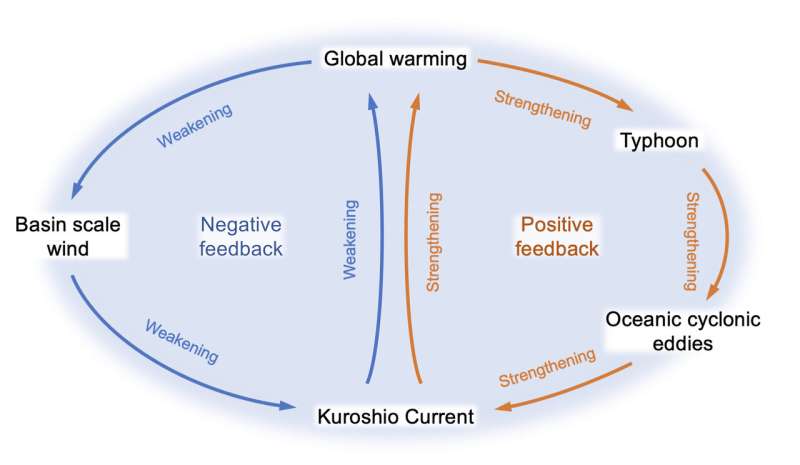May 29, 2020 report
Evidence found of Kuroshio current strengthening due to intensifying tropical cyclones

A team of researchers from the Ocean University of China and Qingdao National Laboratory for Marine Science and Technology, the Second Institute of Oceanography, the Southern Marine Science and Engineering Guangdong Laboratory and the University of Hawai'i at Manoa has found evidence of the Kuroshio current strengthening due to intensifying tropical cyclones. In their paper published in the journal Science, the group describes analyzing climate data revealing evidence that bigger cyclones add energy to spinning eddies.
The Kuroshio current is a mass movement of water in the Pacific Ocean—the current carries warm water from the tropics into the colder, higher latitudes—it is pushed north mainly by wind, but it also gets the occasional boost from giant eddies that form in some parts of the ocean. Such eddies, which are large swirls of water spinning in a circle, are also known as mesoscale eddies, because of their size. They tend to develop, grow and then dissipate over a period of several months. They can be anywhere from 10 to 100 kilometers across, and can extend to ocean depths up to 1000 meters. In this new effort, the researchers report evidence that shows stronger than normal cyclones increasing the strength of the eddies that push the current, resulting in a faster moving current and more warm water moving north. They further suggest that the stronger-than-normal cyclones are the result of global warming.
The team sought to understand why the Kuroshio current has maintained its speed over the past 30 years, despite a 30 percent decline in wind strength over the same period. They suspected that it had something to do with eddy activity. To find out if that was the case, the team analyzed data from satellites and from Argo ocean-based floats (they report salinity and water temperature periodically). It showed an increase in counter-clockwise spinning eddy strength related to local cyclonic activity, and a decrease in the strength of clockwise spinning eddies, which can slow the current. They suggest that warmer ocean water in the higher latitudes could lead to accelerating warming in parts of the northern hemisphere.
More information: Yu Zhang et al. Strengthening of the Kuroshio current by intensifying tropical cyclones, Science (2020). DOI: 10.1126/science.aax5758
Journal information: Science
© 2020 Science X Network















